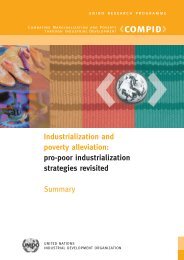Manual on the Development of Cleaner Production Policies ... - Unido
Manual on the Development of Cleaner Production Policies ... - Unido
Manual on the Development of Cleaner Production Policies ... - Unido
Create successful ePaper yourself
Turn your PDF publications into a flip-book with our unique Google optimized e-Paper software.
DEVELOPMENT OF CP POLICY<br />
MODULE 5: POLICY TOOLS AND INSTRUMENTS<br />
SLIDE: Barriers to financing <strong>Cleaner</strong> Producti<strong>on</strong><br />
Access to financing identified as a barrier for implementati<strong>on</strong> <strong>of</strong> more<br />
advanced CP measures:<br />
• Unfamiliar topic to credit <strong>of</strong>ficers;<br />
• Lack <strong>of</strong> specialized credit schemes for CP;<br />
• Poor project preparati<strong>on</strong> capability;<br />
• High (perceived) cost <strong>of</strong> CP implementati<strong>on</strong>;<br />
• Lack <strong>of</strong> enabling envir<strong>on</strong>ment.<br />
<br />
With this slide, present <strong>the</strong> main obstacles to a more widespread financing for<br />
CP. While both <strong>the</strong> lender and <strong>the</strong> borrower can benefit from <strong>the</strong> applicati<strong>on</strong> <strong>of</strong><br />
CP, <strong>the</strong>re are certain problems that need to be addressed to take advantage <strong>of</strong><br />
this opportunity.<br />
Background<br />
More <strong>of</strong>ten than not, <strong>the</strong> current skills am<strong>on</strong>g borrowers and technical CP c<strong>on</strong>sultants are insufficient<br />
to prepare bankable loan applicati<strong>on</strong>s. The implementati<strong>on</strong> <strong>of</strong> CP measures—bey<strong>on</strong>d <strong>the</strong> low-cost,<br />
good housekeeping measures—calls for a customized approach to lending, as well as financial <strong>of</strong>ficers<br />
trained to evaluate <strong>the</strong> benefits <strong>of</strong> <strong>Cleaner</strong> Producti<strong>on</strong>. Streng<strong>the</strong>ning <strong>the</strong> capacity <strong>of</strong> <strong>the</strong> financial<br />
sector in developing countries is thus an important prerequisite to foster cleaner and more efficient<br />
producti<strong>on</strong>.<br />
There are several obstacles to easier availability <strong>of</strong> financing for CP, including:<br />
• Inability <strong>of</strong> financial instituti<strong>on</strong>s to assess <strong>the</strong> technical and financial comp<strong>on</strong>ents <strong>of</strong> CP<br />
investment proposals. This results from <strong>the</strong> fact that <strong>the</strong> impact <strong>of</strong> CP <strong>on</strong> <strong>the</strong> pr<strong>of</strong>itability <strong>of</strong><br />
investments and <strong>the</strong> creditworthiness <strong>of</strong> borrowers is not understood by credit providers, who also<br />
lack <strong>the</strong> technical knowledge to assess <strong>the</strong> CP c<strong>on</strong>tent <strong>of</strong> investment proposals;<br />
• Absence <strong>of</strong> credit schemes customized to <strong>Cleaner</strong> Producti<strong>on</strong> investments. The key problems here<br />
are <strong>the</strong> focus <strong>on</strong> traditi<strong>on</strong>al collateral value, short repayment periods and high interest rates, as<br />
well as a tendency to provide working capital <strong>on</strong>ly;<br />
• Poor project preparati<strong>on</strong> capability, and inability to develop creditworthy CP investment<br />
proposals. This is reflected in <strong>the</strong> fact that most CP assessments undertaken are technical and do<br />
not aim to result in creditworthy investment proposals, including business plans;<br />
• High cost <strong>of</strong> implementati<strong>on</strong> <strong>of</strong> <strong>Cleaner</strong> Producti<strong>on</strong>, combined with <strong>the</strong> comm<strong>on</strong> percepti<strong>on</strong> <strong>of</strong> <strong>the</strong><br />
risk associated with CP investment, as well as limited local availability <strong>of</strong> CP-driven technology<br />
and devices as well as engineering and installati<strong>on</strong> services;<br />
• The absence <strong>of</strong> an enabling envir<strong>on</strong>ment for <strong>Cleaner</strong> Producti<strong>on</strong>, which means lack <strong>of</strong> c<strong>on</strong>ducive<br />
policy envir<strong>on</strong>ment for <strong>Cleaner</strong> Producti<strong>on</strong> and a low demand for CP from <strong>the</strong> industrial<br />
community.<br />
There are no easy soluti<strong>on</strong>s to <strong>the</strong>se problems. However, financial instituti<strong>on</strong>s should familiarize<br />
<strong>the</strong>mselves with <strong>the</strong> ec<strong>on</strong>omic advantages <strong>of</strong> <strong>Cleaner</strong> Producti<strong>on</strong>, and loan <strong>of</strong>ficers should receive<br />
training in evaluating such factors. This implies improving <strong>the</strong>ir knowledge about <strong>the</strong> c<strong>on</strong>cept <strong>of</strong><br />
<strong>Cleaner</strong> Producti<strong>on</strong>, envir<strong>on</strong>mental management systems, material losses and specific envir<strong>on</strong>mental<br />
costs. Banks could be encouraged to stipulate envir<strong>on</strong>mental c<strong>on</strong>diti<strong>on</strong>s when giving credits.<br />
PAGE 129
















